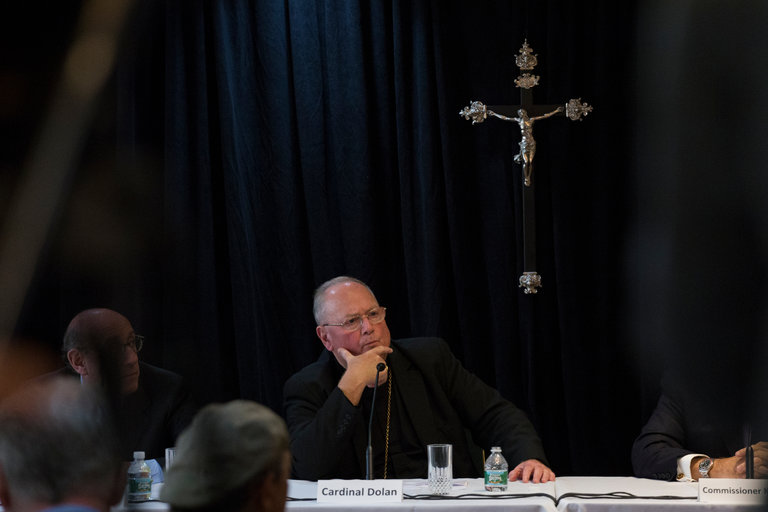New York Archdiocese Offers Compensation Program for Sexual Abuse Victims
By Sharon Otterman and Samantha Schmidt
The Archdiocese of New York has established an independent program that will allow victims of sexual abuse by members of the clergy to apply for compensation from the church, even for abuse claims that are decades old, church leaders said on Thursday. The program will be headed by Kenneth R. Feinberg, who ran the federal Sept. 11 victims fund. It will have the authority to determine who is eligible for compensation and how much is awarded, church officials said. The archdiocese said it would borrow the compensation money, which could easily run into the millions. The program initially addresses the claims of some 200 abuse victims who have approached the archdiocese over the last four or five decades, in cases involving some 40 priests. To date, only about 30 of those victims have received compensation, church leaders said. Cardinal Timothy M. Dolan, the archbishop of New York, said he was inspired by Pope Francis in forming the program and hoped it would become a model for other dioceses to help victims heal. “I wish I would have done this quite a while ago,” he said in an interview. “I just finally thought: ‘Darn it, let’s do it. I’m tired of putting it off.’” For years, victims’ groups and some state lawmakers have pressed for legislation that would lift the statute of limitations on child sexual abuse cases to permit lawsuits by more victims. New York currently has among the most restrictive laws for victims in the nation, requiring that they bring criminal or civil charges by the time they turn 23. The church has actively lobbied against the bill, known as the Child Victims Act, which applies not just to priests, but to anyone who sexually abuses a child. The compensation program, in some ways, is the church’s response, which it hopes gives victims a measure of justice and closure. It also limits the potential for future litigation, critics say. David Clohessy, director of the Survivors Network of Those Abused by Priests, an organization critical of the church’s handling of sexual abuse cases, argued that the timing of the program was hardly coincidental. “We’ve seen the pattern time and time again across the country,” he said. “Whenever statute of limitations reform is making real progress, bishops take these steps, in essence, to say to lawmakers, ‘Hey, back off, we’re handling this ourselves.’” Any victim who agrees to compensation from the fund must sign a release forgoing the right to sue the archdiocese over sexual abuse allegations. That provision drew sharp criticism on Thursday from some victims and their advocates. Anne Barrett Doyle, co-director of BishopAccountablity.org, a watchdog organization that documents abuse cases in the Roman Catholic Church, said the program was an attempt to preemptively settle with victims who would be able to sue the archdiocese if the Child Victims Act were to ever pass. “He’s presenting it as mercy, but it’s actually a shrewd strategy,” Ms. Doyle said. Mary Caplan, a former director of the survivors’ network’s New York chapter, who was abused by a New Jersey priest in New York City as a child, said she would “encourage victims to think long and hard before approaching church officials or their representatives.” Ms. Doyle also criticized the archdiocese’s decision to consider abuse claims only against archdiocesan priests or deacons, not members of religious orders or other priests working in the archdiocese, leaving out a large number of potential abusers. Joseph Zwilling, a spokesman for the archdiocese, said such clergy members were not included because they did not fall under the authority of the archbishop. Such allegations would be referred to the appropriate bishop or religious superior of the order, he said. The program will be administered by Mr. Feinberg and Camille S. Biros, both mediators, and operate in two phases. It will first contact the 170 or so victims known to the church who have not yet received compensation. Beginning early next year, it will encourage claims from victims who have not yet come forward, and will work with law enforcement to investigate any claims against living clergy members. In addition to the victims themselves, the parents of victims who were minors may apply to the fund, as can the legal representatives of deceased victims. While other dioceses have created compensation programs, this one is “rather unique” in the amount of independence it has been given by the archdiocese, Mr. Feinberg said. Direct oversight will be handled by a nonchurch panel: Raymond W. Kelly, the former New York City police commissioner; Loretta A. Preska, a federal district judge; and Dr. Jeanette Cueva, a Columbia University psychiatry professor. Decisions of the commission cannot be appealed or overturned by the archdiocese or the oversight panel. Mr. Feinberg, who has also overseen compensation for victims of the Boston Marathon bombings and the Pulse Nightclub shootings in Orlando, said some criticism of the archdiocese’s program was to be expected because, like all such programs, it will settle claims out of court, and out of public view. But he defended the effort, stressing that it was voluntary and did not preclude changes in the statute of limitations. “If an individual claimant wants the compensation, that’s a decision the individual should be able to make,” Mr. Feinberg said.
|
.
Any original material on these pages is copyright © BishopAccountability.org 2004. Reproduce freely with attribution.
